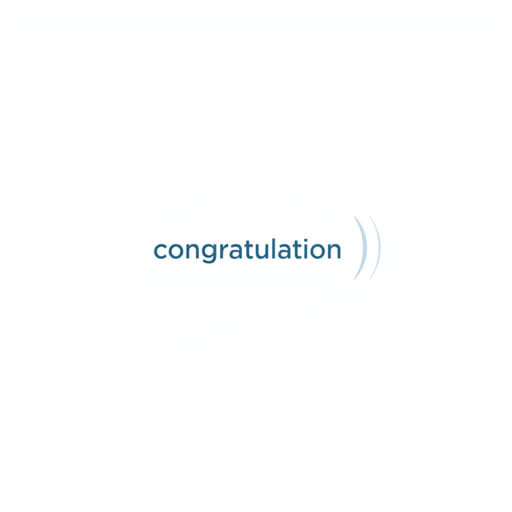In spoken English, proper pronunciation plays a significant role in ensuring that your message is delivered clearly and confidently. One word that often appears in conversations, speeches, and written congratulations is ‘congratulation.’ While the word seems simple enough, many English learners and even native speakers occasionally mispronounce it or stumble over its syllables. Understanding how to pronounce ‘congratulation’ correctly, with clarity and fluency, can enhance your communication, especially in professional or celebratory contexts. This guide will walk you through the correct pronunciation, break down the syllables, and provide tips to improve your spoken English using ‘congratulation’ in context.
Understanding the Word Congratulation
What Does Congratulation Mean?
Before learning how to pronounce the word, it’s important to understand its meaning. Congratulation is a noun that expresses praise for an achievement or good news. It’s commonly used in the plural form congratulations but the singular congratulation can still appear in formal contexts, often within phrases like a note of congratulation.
Word Origin and Structure
The word congratulation has Latin roots, coming from congratulatio, which means to wish joy. The word is structured as follows:
- Prefix:con-(together)
- Root:grat(pleasing, thankful)
- Suffix:-ulation(noun-forming)
Its multi-syllabic structure can be a challenge to pronounce smoothly, especially when speaking quickly or under pressure.
How to Pronounce Congratulation Correctly
Syllable Breakdown
The word congratulation consists of five syllables. It is broken down phonetically as:
kuhn-GRA-chuh-LAY-shuhn
Each syllable plays a specific role in shaping the word’s rhythm and stress pattern:
- kuhn a soft and quick first syllable, almost like ‘kun’
- GRA this is the stressed syllable; pronounce it with emphasis
- chuh pronounced like the ‘chu’ in ‘church,’ but softer
- LAY rhymes with day, and should be pronounced clearly
- shuhn ends softly, sounding like shun
Phonetic Spelling (IPA)
In International Phonetic Alphabet (IPA) notation, the word is transcribed as:
/kÉnËÉ¡rætÊÉËleɪÊÉn/
This representation can help advanced learners focus on the exact sounds, especially useful for those familiar with IPA symbols.
Tips for Proper Pronunciation
To pronounce congratulation effectively:
- Practice slowly, syllable by syllable.
- Emphasize the GRA syllable to maintain the natural stress pattern.
- Make sure the chuh sound is not pronounced as shuh; keep the ch clear.
- Avoid swallowing the last syllables clearly say LAY and finish with shuhn.
Common Pronunciation Mistakes
Incorrect Stress Placement
Some speakers stress the first syllable con instead of gra, resulting in awkward pronunciation. Remember, the emphasis should always be on GRA.
Mispronouncing chuh as shuh
It’s easy to confuse the ch with sh, but the correct sound in congratulation is chuh, similar to cheese.
Dropping Syllables
Sometimes, especially in fast speech, people drop a syllable or slur the word. Make sure you pronounce all five syllables with clarity.
Practicing with Sentences
Sentence Practice
Use these example sentences to practice saying congratulation in natural speech:
- Please accept my heartfelt congratulation on your promotion.
- He sent a message of congratulation after hearing the good news.
- Her note of congratulation was deeply appreciated.
Read these sentences aloud, focusing on the pronunciation of the key word while maintaining natural rhythm and tone.
Using Variations
Though congratulations (with an s’) is more common, practicing the singular form helps refine your articulation of complex words. Both versions follow the same pronunciation rules, except that congratulations simply adds an s sound at the end.
Techniques for Mastering Pronunciation
Break It Down
Start by pronouncing each syllable separately. Once you are comfortable with each part, blend them together slowly. For example:
Kuhn GRA chuh LAY shuhn
Repeat and Record
Practice saying the word multiple times and record your voice. Compare your pronunciation to native speakers and adjust your tone and stress accordingly.
Practice with Native Speakers
One of the best ways to improve pronunciation is to speak with fluent or native English speakers. Ask them to repeat the word and listen carefully to their stress, intonation, and rhythm.
Use Tongue Twisters and Exercises
Create or find phrases that use similar sounds. This will help you build muscle memory for pronouncing difficult combinations like chuh and shuhn.
Why Correct Pronunciation Matters
Clarity in Communication
Mispronouncing a common word like congratulation can lead to confusion, especially in formal situations. Speaking clearly ensures your message is understood exactly as intended.
Confidence in Speech
When you know how to pronounce a word properly, you naturally become more confident in conversation. Whether you’re giving a speech, writing a card, or sending a message, using congratulation correctly adds a touch of professionalism and thoughtfulness.
Building Vocabulary
Learning pronunciation isn’t just about one word. As you practice saying congratulation, you also develop an ear for similar words and patterns, which strengthens your overall English fluency.
Mastering how to pronounce congratulation can take some time and practice, especially if English is not your first language. However, with clear steps, a focus on syllables, and repetition, you can build the confidence to use the word in everyday and formal situations alike. Remember to break the word down into syllables, pay attention to stress, and use it in context often. Pronouncing congratulation correctly will enhance both your spoken English and your ability to express joy and success to others in a meaningful way.
